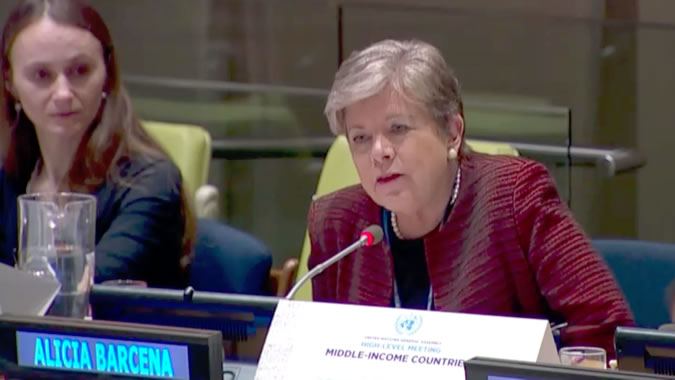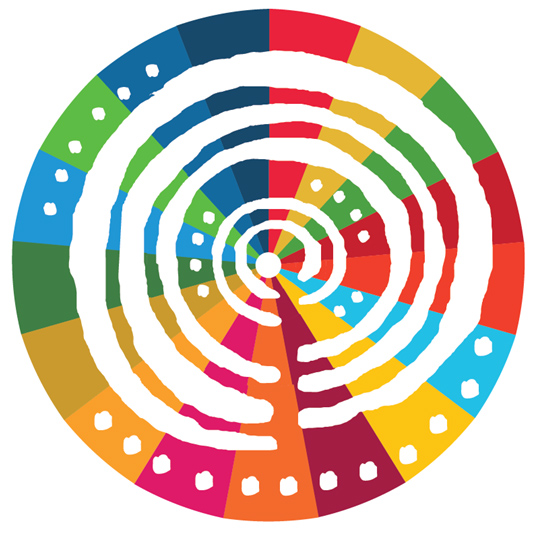2030 Agenda Represents a Paradigm Shift for International Cooperation with Middle-Income Countries: Alicia Bárcena
Work area(s)
At a high-level meeting of the UN General Assembly on middle-income nations, ECLAC’s Executive Secretary stressed the importance of multilateralism and South-South and triangular cooperation.

The New Development Agenda through 2030 – which calls for making transformative changes and overcoming structural barriers to achieve sustainable development with greater equality, leaving no one behind – represents a paradigm shift in international cooperation with so-called middle-income countries, Alicia Bárcena, Executive Secretary of the Economic Commission for Latin America and the Caribbean (ECLAC), indicated this Tuesday, December 4, at a high-level meeting convened by the United Nations General Assembly in New York.
The High-level Meeting on Middle-Income Countries was led by the President of the UN General Assembly, María Fernanda Espinosa, and attended by ministers and authorities from numerous countries in Latin America and the Caribbean, Europe and Africa, as well as representatives of international organizations and UN system bodies, such as the World Bank, the International Monetary Fund (IMF), the Organization for Economic Cooperation and Development (OECD), the United Nations Office for South-South Cooperation (UNOSSC), the United Nations Development Program (UNDP), the United Nations Economic and Social Council (ECOSOC), and the UN regional commissions for Africa (ECA) and Latin America and the Caribbean (ECLAC).
On a panel addressing “The role of South-South cooperation and Triangular cooperation in the implementation of the 2030 Agenda for Sustainable Development” – which was moderated by Ileana Núñez Mordoche, Cuba’s Deputy Minister of Foreign Trade and Investment, in her capacity as Chair of ECLAC’s South-South Cooperation Committee – Executive Secretary Alicia Bárcena underscored that a new cooperation pattern based on multilateralism is needed, one that reduces asymmetries and ensures the full participation of all countries in transition in development cooperation schemes.
She explained that the New Development Agenda – made up of the 2030 Agenda for Sustainable Development and its 17 goals (SDGs), the Addis Ababa Action Agenda on Financing for Development, the Sendai Framework for Disaster Risk Reduction, and the Paris Agreement on Climate Change – will require resources ranging between $2.5 and $4.5 trillion dollars per year (according to the United Nations Development Group’s 2017 calculations).
“This 2030 Agenda proposes a paradigm shift for middle-income countries, in the face of a complicated global context characterized by a crisis of multilateralism, deteriorating foreign trade and foreign direct investment, a less dynamic global economy, a more uncertain and financially complex world, and an unprecedented technological revolution,” she stated.
Bárcena recalled that 28 of Latin America and the Caribbean’s 33 countries are classified as middle income (85% of the region), which complicates its access to traditional sources of financing, such as Official Development Assistance (ODA).
In this context, the senior United Nations official stressed that it is necessary to deepen South-South cooperation and triangular cooperation, since both foster a new cooperation model among peers that allows for protecting the interests of middle-income countries, strengthening the participation of developing nations in global forums for fiscal cooperation, and confronting harmful tax competition between countries through integrated regional programs.
“GDP per capita does not reflect structural gaps and should not be the criteria for allocating financing. This is about improving countries’ ability and capacity to define their needs and policies on their path toward sustainable development. We must close gaps to save, invest and mobilize internal and external resources (capital markets, foreign direct investment and remittances),” Bárcena explained.
“This paradigm shift entails strengthening South-South cooperation, which provides greater horizontality, fosters a greater sense of ownership on the part of the receiving country and a sense of shared responsibility. It has a double dividend both for the donor and the receiver, and it stimulates technological capacities among them both. Meanwhile, triangular cooperation has the strategic potential to challenge current governance of the international system and it sparks reflection regarding forms of assistance by defining new consensuses and actors,” Bárcena indicated.
She emphasized that it is necessary to redefine policies and criteria for allocating international resources as part of North-South, South-South and triangular cooperation, as well as to create new metrics that incorporate the multidimensionality of development and to mobilize public and private sources of financing that cannot replace the ODA commitment of 0.7% of GDP.
Earlier in the day, at a luncheon on middle-income countries convened in the framework of the General Assembly meeting, Alicia Bárcena referred to the “middle income trap” that countries fall into when, having reached their technological frontier, they cannot compete globally on the basis of low wages, nor have they been able to develop greater levels of innovation, technological change and knowledge-intensive goods and services.
“The middle income trap is a pervasive constraint on development as it prevents countries from sustaining growth in the long run and converging at the same time toward more advanced economies. The countries of Latin America and the Caribbean are continually struggling to overcome this,” she stated.
Bárcena indicated that overcoming this trap requires development policies and strategies that confront the structural gaps and obstacles keeping middle-income countries from achieving inclusive growth with greater equality.
“That is why at ECLAC we have proposed the structural gap approach, which constitutes an alternative framework for organizing the logic of the development cooperation system, based currently on per capita income, which determines the allocation of official assistance flows,” she indicated.
Related content
Desafíos de los países de renta media en la cooperación para el Desarrollo Sostenible: Una perspectiva desde América Latina y el Caribe
Presentación de Alicia Bárcena, Secretaria Ejecutiva de la CEPAL, en la reunión de alto nivel de la Asamblea General de las Naciones Unidas sobre los países de renta media.
Related link(s)
Country(ies)
- Latin America and the Caribbean
Contact
Public Information Unit
- prensa@cepal.org
- (56 2) 2210 2040

